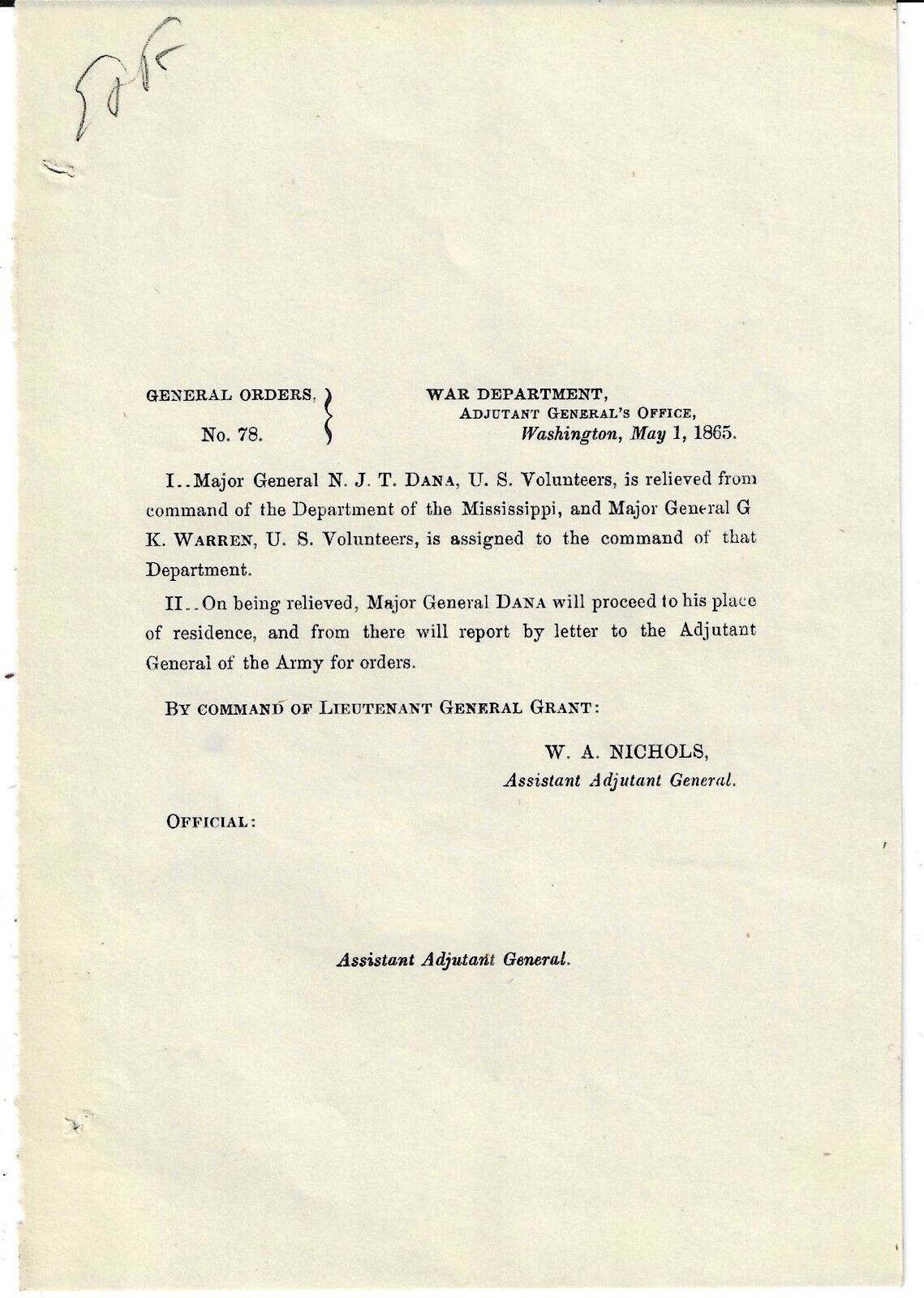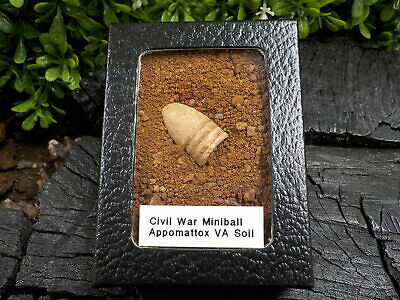-40%
Civil War: Grant's Vindictiveness Against Gouveneur Warren Removed His Command
$ 314.16
- Description
- Size Guide
Description
Offering a four-piece assemblage relating to GOUVENUR KREMBLE WARREN’S removal of his command at the orders of Lt. Gen. Ulysses S. Grant, who didn’t like Warren. Grant had ordered Maj. Gen. Philip H. Sheridan to handle Warren’s removal, which he gladly did. At a later point, Warren asked the army to hold an inquiry into Sheridan’s treatment of him. Warren was exonerated but sadly died before the report was issued. This assemblage relates to Warren and the inquiry, including,One-page printed General Orders No. 78 from the War Department, May 1, 1865. “Major General N.J.T. Dana, U.S. Volunteers, is relieved from command of the Department of the Mississippi, and Major General G.K. Warren, U.S. Volunteers, is assigned to the command of that Department...By Command of Lieutenant General Grant...” [This was reflective of Warren’s removal of command.]
One-page, partly written, subpoena Court of Inquiry Rooms, Governor’s Island, New York City. The President of the United States. To Brevet Major General SAMUEL WYLIE CRAWFORD. MAY 5TH, 1880. “...From the Headquarters of the Army...to testify and give evidence, according to law, all that you may know concerning the pending case then and there to be examined and inquired into at demand of Lieutenant Colonel Gouveneur K. Warrant...relative to his conduct at the battle of ‘Five Forks,” Virginia in March and April 1865...You will bring with you to be used as evidence...the following described documents...the originals of all dispatches and official communications relating...to the operations and conduct of General Warren and of the Fifth Army Corps either separately or in co-operation with other troops from the 28th of March 1865 to the 1st of April 1865...of copies of such dispatches and communications...Loomis L. Langdon, Brevet L Colonel” Signed by Langdon, a West Point graduate in 1850. He served in the Civil War and was brevetted Major for Gallantry and meritorious service in the Battle of Olustee Florida, and Lt. Col. For the attack on Fort Gilmer , VA.
Four-page memorial announcement of Warren’s death, General Orders 5, August 9, 1882, praising Warren’s many accomplishments, promotions, battles for the army, including his enormous contribution at Gettysburg.
Fifteen-page biographical sketch of Warren reprinted from the proceedings of the Association of the Graduates of the U.S. Military Academy – Annual Reunion June 12, 1889.
Warren (1830 – 1882) graduated second in the 1850 class of the U.S. Military Academy. The Civil War erupted while Warren was teaching mathematics at West Point. He accepted a commission as lieutenant colonel of the Fifth New York Regiment and was soon promoted to Colonel and Commander of the regiment. He led a brigade in the Peninsula Campaign and was wounded at Gaine’s Mill. After combat at the Second Battle of Bull Run, he participated in the Battle of Antietam. Warren gained his greatest military fame at the Battle of Gettysburg, where, through his expertise as a topographer saw that Little Round Top was undefended and in danger of being captured by Confederate forces. He persuaded a brigadier commander to occupy the hill, which the soldiers held against the rebels. Warren became known as “The Hero of Little Round Top.” He was slightly wounded during the battle.
Warren fought in several engagements in the Virginia Campaign, including Bristoe Station and Mine Run. He led his troops in the battles of Wilderness, Spotsylvania, North Anna, Bethesda and Cold Harbor. In March 1865, he was breveted to major general in the Regular Army. Warren led his corps in the Battle of Five Forks, the first action of the Appomattox Campaign. By that time, Lt. Gen. Ulysses S. Grant had found Warren troublesome because of his questioning of orders and unwelcome suggestions. Grant gave Maj. Gen. Philip H. Sheridan, who didn’t like Warren, authority to remove him, which Sheridan promptly did, alleging that Warren failed to press action at Five Forks. A deeply hurt Warren was put in charge of the defenses of Petersburg and later the Department of Mississippi.
One of the main charges cited by Sheridan against Warren was actually a heroic act of Warren. At Five Forks, GEN. SAMUEL WYLLIE CRAWFORD’S division drifted away through heavy woods from the main attack. Warren personally rode off to retrieve Crawford’s division.
From his dismissal as a corps commander until the end of his life, Warren implored the army to establish a court inquiry to investigate Sheridan’s treatment of him. A court was finally convened in 1879. Its report, issued in 1882, exonerated Warren. Unfortunately, Warren died at age 52 shortly before the report was made public. At his request, he was buried in civilian clothing and without military honors. Despite the cloud over his military reputation, he had proven himself to be a brave and capable commander. A statue of him was erected on Little Round Top in 1888.
Expected toning. Overall excellent condition.
Everything we sell is guaranteed authentic forever to the original buyer. We also offer a 30-day return policy. If you discover a problem or are dissatisfied with an item, please contact us immediately. Our goal is to please every customer. We are pleased to be members of The Manuscript Society, Universal Autograph Collectors Club, The Ephemera Society, the Southern New England Antiquarian Booksellers and the Preferred Autograph Dealers and Auction House. [CW 190]













